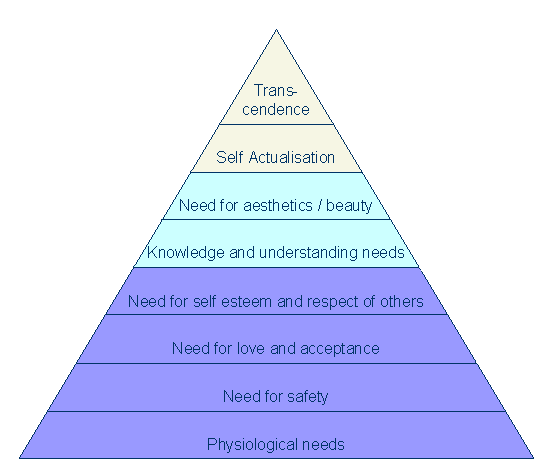Maslow’s Eight Basic Needs and Eight Stage Development Model

Some of us are familiar with Maslow’s hierarchy of needs. Although we tend to think of five basic needs, Maslow added three more needs to this hierarchy, making a total of eight basic needs. The modified diagram is shown below.
Among these first four needs, Maslow identified “deficits” that, if not met, make us uncomfortable and push us to meet them.
The last four needs he identified are “growth needs” that we constantly crave. These needs constantly motivate us as they relate to our personal growth and development.
He placed these needs in a hierarchy so that we are only driven by a need when the lower needs are met. So before being motivated by cognitive or self-actualization needs, one must have these basic needs met, such as physiological needs, safety, belonging, and esteem.
I would now like to introduce you to the eight needs defined by Maslow and explain these eight states in the form of an analogy.
1- Physiological needs:
These are the basic needs of animals such as food, warmth, shelter, sex, water, but also other physical needs. When a person is hungry or thirsty, or when his body is “chemically” out of balance, all his energy is spent on correcting these deficiencies. The other needs are then inactive (safety, belonging, etc.). If our basic biological needs are not met, we can never attain a sense of security. We will find ourselves in a state of neurosis and anxiety.
2 – Need for security:
After the physical needs are relatively well satisfied, the human need for security comes to the fore. This need is related to the human quest for a predictable and orderly world where injustice and inconsistency are under control, the familiar is common and the unknown is rare. This need for consistency, if not met, leads to feelings of doubt and shame (as opposed to feelings of autonomy or control) and results in a high consciousness or need for discipline and control. order.”
3- Need for Love and acceptance:
Once the physiological and safety needs are satisfied, the third level of human needs is social. This psychological aspect of Maslow’s hierarchy includes relationships based on emotions in general, such as friendship, sexual intimacy, and a supportive and communicative family. When we make this observation of the failure of close relationships, we are afflicted by negative social emotions such as feelings of guilt (towards the initiative) and low extroversion scores.
4- Need for esteem and respect of others:
All people have the need to be respected, to have self-esteem and self-respect, and to respect others. We need to be engaged in order to be recognised and to engage in one or more activities that make us feel like we are contributing, in order to feel accepted and valued, both professionally and in family or friendships. When this need is not met, it leads to feelings of inferiority toward others. Feelings of inferiority can in turn lead to low sympathy.
5- The need to know and understand:
Maslow believed that humans need to develop their intelligence. Cognitive needs are expressions of the natural human need to learn, explore, discover, and create in order to better understand the world around him. This growing need for self-actualization and learning, if not met, leads to confusion and an identity crisis. It is also directly related to the need to explore or be open to new experiences.
6- Need for beauty and aesthetics:
According to Maslow’s beliefs, man needs “beautiful images” or something new and aesthetic to realise himself. Man needs to renew himself in the presence and beauty of nature, carefully absorbing and observing his surroundings to capture the beauty of what the world has to offer. This need for a higher level allows us to approach the environment and leads to a sense of familiarity with nature and all that is beautiful.
7- Need for self-actualization:
Self-actualization is an instinctive need of man to make the most of his abilities and to strive to be the best. When this need is satisfied, it leads to a sense of creativity and imagination.
8- Transcendence:
Maslow then added transcendence at the apex of the triangle, sometimes referred to as the spiritual need. When this need is satisfied, it leads us to a sense of wholeness and takes us to another transcendent level.
The tree of Life also represent another way to describe our need especially in Geburah (Spiritual needs), Netzah and Malkuth (Physical needs).
To find out more information about those 3 spheres, Check out my development programs
